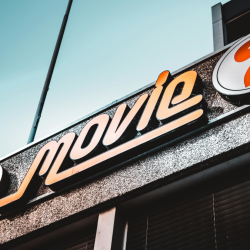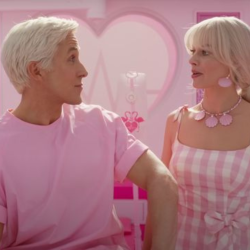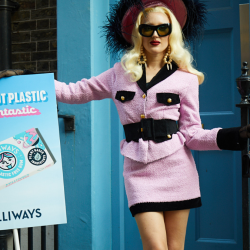I walk out of the office in Bloomsbury and see a woman with a pink sweatshirt, I think of Barbie. I walk into the tube and see Wizz Air’s new campaign billboard with a pink background, I think of Barbie. I walk past my yoga studio in Camden and see pink smelly trash bags in the middle of the pavement, I think of Barbie.
I know that I am not the only one. Social media is filled with people posting anything pink with the infamous Barbie song and the vast majority of them didn’t receive a payment from Greta Gerwig or Margot Robbie. (Here’s my trashy post on Instagram, unpaid.) They are throwing Barbie-themed parties and it’s enough to have pink socks to be let in — something Oppenheimer can’t match.

Barbie the movie’s marketing team is well aware of this. Just look at this brilliant billboard they put out: communicating a movie’s release date, in which a few of the world’s most beautiful women and men star, only with a colour requires some courage. And a great understanding of mental availability models — something marketers don’t think enough of.
Byron Sharp defines mental availability as a brand’s ‘share’ in customers’ minds. Do they remember the brand when they walk into a certain location? Do they get the urge to drink that beer when the weather gets too hot? As this article greatly summarizes, it’s difficult not to think of Guinness when in an old wooden pub and a Corona will always ease the heat (till a germ is named after it). And pink is Barbie.
Mental availability is not simple awareness or recognition. If you have the money, those are to build. Just pay Global and see your brand’s name all over London. Most of us probably remember Getir’s ads in the tube or the busses when they first launched in the UK but do we think about Getir when we see a shopping basket? Nope. An ad-spree may be enough to make yourself known but it’s not enough to be memorable. Immemorable fame is a waste of potential (and a lot of money).
It’s extremely difficult to build mental availability because it requires long-term, brand-focused, consistent communications. People don’t pay much attention to almost anything and things that may seem obvious to marketing people (that little detail in that billboard!) are mostly invisible to the masses. But to remember, one must first pay attention and associate things with each other: a colour can be the memory asset of a product but only if they insist.
Nike’s commitment to representing excellence in sports or Apple’s insistence on being used by people ‘who are crazy enough to think they can change the world’ are good examples of this. Nike sometimes doesn’t even point to its logo in ads and focuses simply on athletes.
Remember Steve Jobs claiming after the launch of the Think Different campaign that if John Lennon was alive, he would be using an Apple Computer? These are bold but memorable decisions. To be fair, when you are competing with the Netflixs of the world for attention, it is quite difficult to capture people’s attention. Most brands don’t dare anymore.
In a world where you can pay your way to fame, marketing has become obsessed with data, targeting and return on investment statistics. These can of course be useful but only if they are used for the right purposes. However, fame and association come from the masses. If you are not selling Levi Strauss rivets, the way to be memorable is not speaking to a niche market of targetable individuals — it’s capturing the attention of the masses.
Overall, the Barbie experience we are going through should make marketers rethink their priorities. Being the most innovative, weird or the first brand in the metaverse is nothing compared to owning a colour. Pink trash bags can literally sell tickets to a Barbie movie.
Feature image: Barbie Pink color pantone, fe46a5































